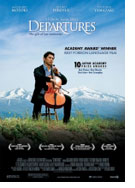

Opening 26 Nov 2009
Directed by:
Yôjirô Takita
Writing credits:
Kundo Koyama
Principal actors:
Masahiro Motoki, Tsutomu Yamazaki, Ryoko Hirosue, Kazuko Yoshiyuki, Kimiko Yo
Departures is the dark horse that won the 2009 Oscar® for Best Foreign Language film. Treading where few films have dared to go, the film explores the bond between the living and those that die. Ironically, director Yôjirô Takita’s frustration at not finding a distributor prompted him to shout at the film’s publicity staff, “Why don’t you put it in for the Academy Awards?,” never dreaming it would be nominated, much less win.
Cellist Daigo Kobayashi’s (Masahiro Motoki) Tokyo orchestra is abruptly disbanded. Doubting his prowess as a musician, he proposes to his wife Mika (Ryoko Hirosue) that they return to his hometown, where they can live in the house he inherited from his mother. Cheerfully Mika agrees, albeit saddened when he sells his expensive cello. Daigo knows going home means he has to confront his anger toward his father, who ran off when he was six years old.
They move, Daigo replies to a classified ad he thinks is at a travel agency, and Ikuei Sasaki, the Nokan-Chef (Tsutomu Yamazaki), hires him straight away. But… the ad had a typo error: the last word was missing before “departures”; the job is for a nokanshi or encoffineer, the person who ceremoniously prepares a dead body for his/her last trip, in a coffin, to the next world. (The Japanese title Okuribito means “send-off person”).
The first death Daigo assists at completely unnerves him, so he goes to the local bathhouse to cleanse himself. The owner, Tsuyako Yamashita (Kazuko Yoshiyuki), is the mother of his best childhood friend who, Daigo learns, wants her to sell the Bath. However, Tsuyako enlightens Daigo why for her it is important, with her competent assistant Shokichi Hirata (Takashi Sasano), to keep the Bath open. Much later, in the early morning hours, Daigo leaves his bed to find and play his childhood cello; lying in bed, Mika hears and smiles. Inevitably, eventually Mika learns what his job entails; like Tsuyako’s son, her reaction is strong, “Don’t touch me, you’re unclean.” She gives Daigo an ultimatum: quit the job or she will leave. Mika leaves.
His skill at handling the corpses improves; Daigo grasps that he feels pride in carrying out the ritual and recognizes the gratitude he receives from families of the deceased. Conversations with Sasaki and his assistant, Yuriko Kamimura (Kimiko Yo), add to his understanding. He learns much from his boss, applies his own creative sensitivity and evolves into a gifted nokanshi. As he gently prepares the dead for departure while their loved ones watch, Daigo experiences a gradual yet profound shift in his perceptions for life and living. This inner journey reaches a crescendo when the dead are people close to him; how Daigo handles these bonds will shape his relationships in the realm of the living.
Departures embraces death with dignity, humor, empathy, melancholy and honesty. All the actors are excellent; Motoki, preparing for the role, had to learn how to handle a cello and a corpse, and Yamazaki as the astute, magnanimous boss speaks volumes through his facial and body movements. Takeshi Hamada’s cinematography exquisitely captures the graceful, elegant movements imbued in both the encoffinment ceremony and the Japanese landscape. Director Takita and Joe Hisaishi, whose original music enhances the structure of the film, chose the cello for the wide range of tunes it is able to play, which highlight the complex emotional range the main character confronts. Kundo Koyama’s insightful script and Akimasa Kawashima’s editing further convey the universal messages beautifully depicted in this film. Gatekeeper Hirata describes it thus: “… it’s not death, (one) just goes through a door. (And I tell them) Have a good trip. We’ll meet again.” Departures is a vehicle through which audiences may come closer to the death side of life. (Marinell Haegelin)